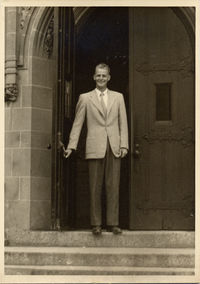
Phillip L. “Pete” Stack,
Graduation Day 1951, Dillon Hall
While I was working on my Master’s degree, diligently investigating the effects of ozone-induced free radicals on the structure and function of key proteinase inhibitors that prevent oxidative damage to lung tissue, my father was rapidly losing his battle with lung cancer. Phillip Leo ‘Pete’ Stack (Notre Dame class of 1951) did not really have much of a chance at survival in 1986, as the 5-year survival rate for lung cancer was only 13%. Pete joined the unlucky 83% who did not last anywhere near 5 years, and our family watched helplessly as this robust, hilarious, and highly cantankerous 6’6” tall 58-year-old transformed into a skeletal, bald, and weak shadow prior to his death.
Fast-forward 30+ years to 2020. In the intervening decades, we have witnessed transformative discoveries, fueled by basic research, that have advanced and clarified our understanding of cancer as a highly complex family of diseases. Research has led to the development of novel detection technologies that enable diagnosis of early-stage, more curable cancers. Basic research focused on elucidating the sequence and structure of the human genome has given us new tools with which to complement diagnostic pathology, allowing for a molecular-level classification of many tumor types and subsequently facilitating the development of patient-targeted therapeutics. With this wealth of information, the 5-year survival rate for some cancers, most notably many subtypes of breast and prostate cancer, now exceeds 90%.
Collaboration is key to this success. The Harper Cancer Research Institute (HCRI) was designed with collaboration as a foundational principle and supports cancer-focused convergence research conducted at the boundary between disciplines in science and engineering. By design, this approach enhances innovation and augments the pace of discovery. However clinical partners are indispensable to translate basic discovery into advances inpatient care. To this end, the HCRI is pleased to expand our portfolio of translational collaborators to include clinicians in the Translational Bridge program, led by Dr. Leonidas Platanias at the Robert. H. Lurie Comprehensive Cancer Center. The Translational Bridge program will provide co-mentorship of HCRI’s Interdisciplinary Interface Training Program (IITP) post-doctoral fellows with Lurie Cancer Center clinicians. Together with their research and clinical mentors, Translational Bridge fellows will design and execute a cancer-focused translational project with the ultimate goal of propelling laboratory research into investigator-initiated clinical trials. We anticipate exciting results from this new collaborative opportunity.

Pete’s favorite saying. Colored pencil
drawing by Rachel Norsworthy
Newly published data from the American Cancer Society show that collaboration between researchers and clinicians, together with a hefty dose of public policy efforts aimed at smoking cessation, have finally resulted in a substantial decrease in the age-adjusted lung cancer death rates (5% decrease for men, 4% decrease for women)! However while the 5-year lung cancer survival rate has risen a bit from Pete’s day (up to 20% in 2017), unfortunately, there are still more deaths from lung cancer than prostate, breast, colorectal and brain cancers combined.
Simply stated, we still have much work ahead. On the subject of work, one of my father’s favorite topics, Pete often asserted “If you’re not going to do it right, don’t do it at all”. This was extremely annoying to my siblings and me as teenagers trying to skip out on weeding endless rows of green beans in the boiling South Carolina summer sun. Now Pete’s mantra has become our motivation. Working together in the fight against cancer, we are making real progress that is keeping our loved ones with us longer – and that’s doing it right!
Originally published by at harpercancer.nd.edu on January 20, 2020.
